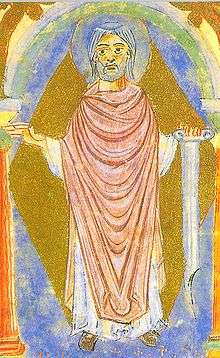Saint Solus
Saint Solus (also Sualo, Sola) (died 794)[1] was an English monk, in Germany with St. Boniface.[2]

Solus was ordained priest by Boniface, became a monk, and established himself in a cell at Solnhofen in Suabia. His reputation for sanctity caused Charlemagne to make him a grant of the land where he had set up his hermitage; and Solus then bestowed it as a cell on Fulda Abbey. He died about 790. His feast was celebrated on 3 December.[2]
A life of Solus was written in the ninth century by Ermanric, abbot of Elwangen, who claimed to have derived his information from an old servant of the saint. This life was printed by Luc D'Achery, and in Jean Mabillon's Acta Sanctorum Ordinis S. Benedicti, III, ii. 389–98, ed. Venice, 1734.[2]
Notes
- Costambeys, Marios. "Sualo". Oxford Dictionary of National Biography (online ed.). Oxford University Press. doi:10.1093/ref:odnb/25993. (Subscription or UK public library membership required.)
- Lee, Sidney, ed. (1898). . Dictionary of National Biography. 53. London: Smith, Elder & Co.
Attribution
![]()